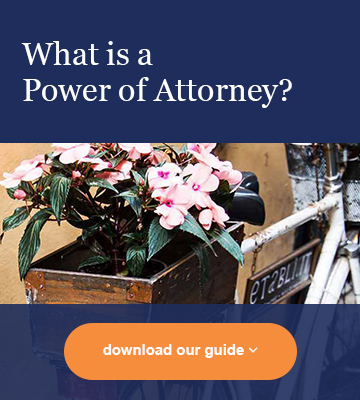
Advancements in technology and modern medicine mean Australians are living longer. The average life expectancy for men in Australia is 80 years and for women, 84 years. But while the body may remain functional until this age, the mind often fails. Nearly one in 10 people over the age of 65 have dementia.
Whether its dementia, a stroke, an accident or something else which causes a person to lose capacity to make their own decisions, the legal implications can be serious if you haven’t made any provision or plans for how to deal with the situation should it arise.
This is why many people prepare a legal document known as an Enduring Power of Attorney, which authorises another person or persons to act on your behalf in managing your affairs should you lose the capacity to do so. Often this step is taken as part of the wider estate planning process you might undertake with a legal representative and/or financial adviser.
Your appointed Attorney can make important decisions on your behalf about personal and health matters, as well as about your financial affairs, should you lose capacity.
What happens when no Enduring Power of Attorney has been made?
If a person loses capacity and they have not made an Enduring Power of Attorney, unfortunately it is too late for them to make an EPA. This is because a person must have sufficient legal capacity to make an EPA. Once a person has lost capacity the only option is for a family member, close relative, close friend or even a trusted professional (such as a lawyer or a financial adviser) to apply to the Queensland Civil and Administrative Tribunal (QCAT). OCAT can appoint a person to be your administrator (to make financial decisions) and/or your guardian (to make personal and health decisions). One person can hold both roles, if suitable.
It should be noted that this process can take a number of months. If there is some uncertainty or dispute about the capacity of a person, QCAT can also make a declaration about an adult’s decision-making capacity for some or all matters.
In order to apply to be administrator and/or guardian of a person who has lost capacity, you must:
- be over the age of 18;
- not be a paid carer or health provider for the person;
QCAT will also have regard to a number of appropriateness and competency considerations of the person seeking to be appointed as an Administrator or Guardian. These include:
- respects the principles in the Guardianship Law;
- be free of conflicts of interest regarding the affairs of the person you’re applying to take care of;
- is compatible in terms of culture and communications with the adult;
- is available and accessible;
- has competency to carry out the functions of Administrator and Guardian.
The following factors may weigh against an appointment:
- a criminal record;
- a previous removal from appointment as an Attorney or Guardian; or
- bankruptcy.
Guardians and administrators can be appointed for up to five years. Guardians and Administrators are entitled to be reimbursed for their reasonable expenses (but cannot be paid for their services). The appointment can be reviewed by QCAT and an Administrator or Guardian removed under a range of circumstances.
In cases where no-one is available to be an administrator and/or guardian for a person who has lost capacity, the Public Trustee may be appointed as Administrator to manage your financial affairs, and/or the Public Guardian (OPG) may be appointed as Guardian for personal/health matters. It should be noted the Public Trustee will charge fees for its role.
What is a guardian and/or administrator responsible for?
If you are appointed as the Guardian of a person who has lost capacity, you can then make important personal/health decisions on their behalf. These matters might include decisions about where and with whom they live (such as an aged care facility); whether to consent, refuse or withdraw consent to particular types of health care (such as an operation the person might need); and even more routine issues such as what to eat and how to dress, and with whom they may have contact or visits with.
If you are appointed as the person’s Administrator, you are authorised to make financial decisions on their behalf, such as income and investment decisions, operating their bank accounts, buying and selling property, shares and other assets and paying debts and liabilities on their behalf.
The value of expert legal advice
The major benefit of making an Enduring Power of Attorney is that you get to choose who will be your Attorney and you can set the terms for what they are authorized to do on your behalf.
We can assist you to understand and prepare a carefully drafted Enduring Power of Attorney which is particular to your individual needs and situation. We can also advise on guardianship or administration matters in cases where someone has not made an Enduring Power of Attorney, including helping you prepare an application to QCAT.

